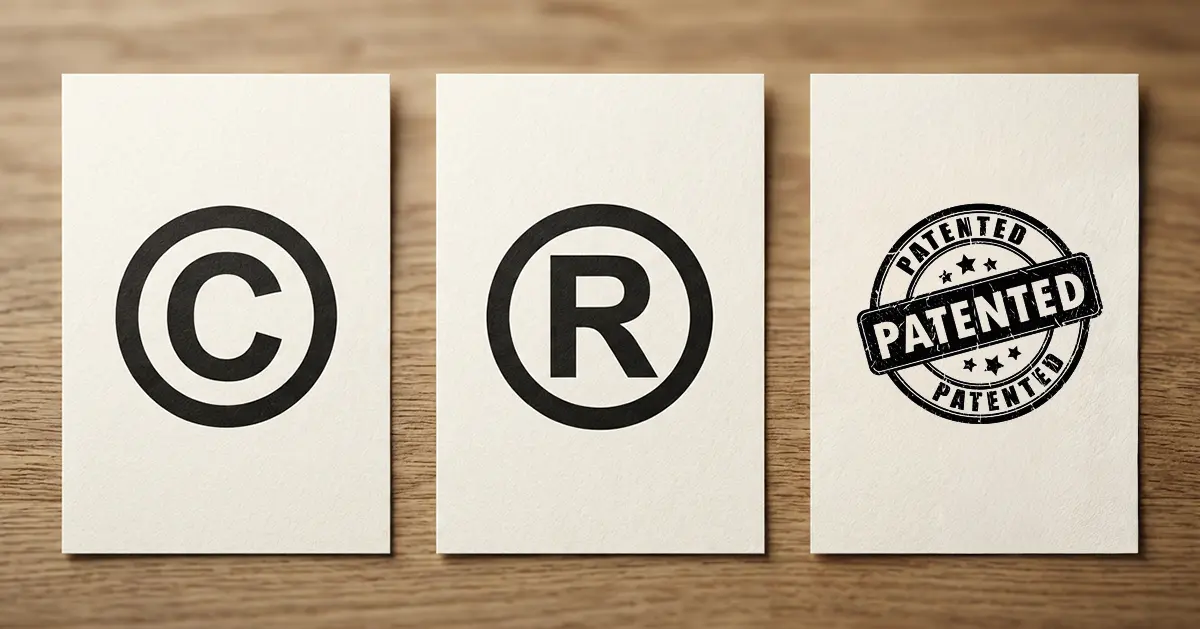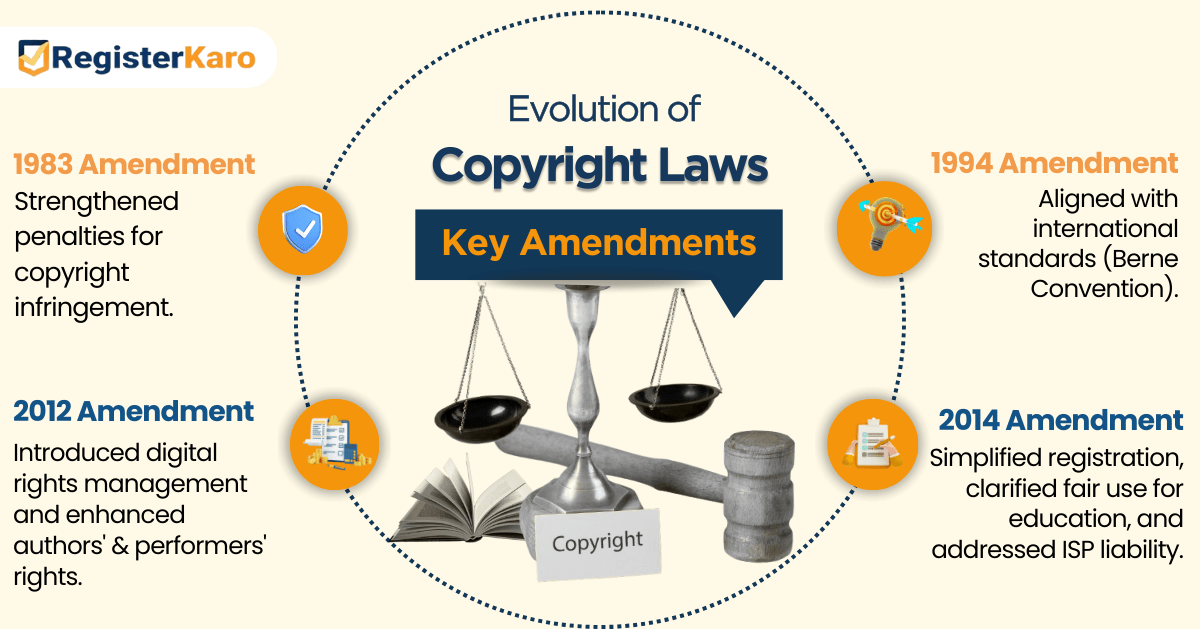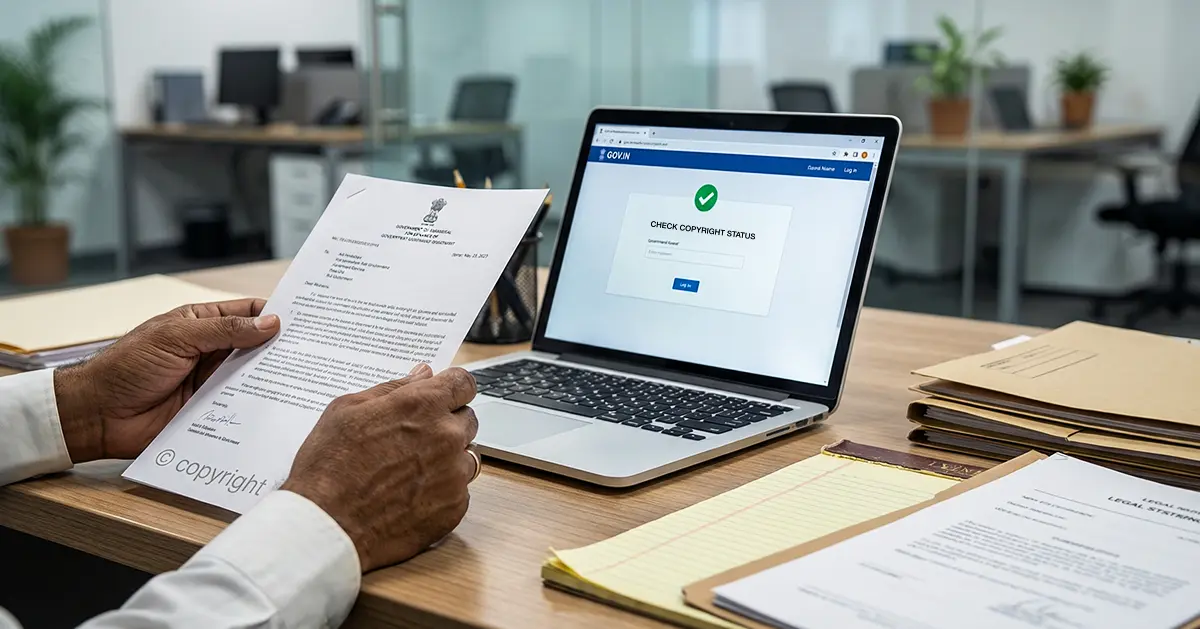
Introduction
In India today, the Evolution of Copyright Laws has established a framework that holds a critical position in the creative landscape. These copyright laws honor and compensate authors of unique artistic, musical, and literary works while encouraging continued creative production and distribution.
The Evolution of Copyright Laws has meticulously balanced creator and public interests over time. Through this development, copyright laws now ensure that owners’ rights are protected, giving them control over how their works are used, shared, and commercially exploited in an increasingly digital world.
Origins: Early Forms of Copyright Protection
Did you know? In ancient India, knowledge was primarily transmitted orally, with guru-shishya traditions emphasizing the sharing rather than ownership of knowledge. This cultural value continues to influence debates about the Evolution of Copyright Laws in India today!
The Evolution of Copyright Laws began long before the term “copyright” existed. Ancient civilizations, including those in the Indian subcontinent, valued creative works, but formal copyright laws as we understand them today were absent.
The First Modern Copyright
The Statute of Anne in 1710 marked a pivotal moment in the Evolution of Copyright Laws, establishing the first modern copyright law in Great Britain. This groundbreaking legislation acknowledged authors’ rights rather than publishers’ privileges, setting the stage for centuries of law evolution in this domain.
Indian Copyright Act, 1957: The Foundation
The Evolution of Copyright Laws in India reached a watershed moment with the enactment of the Indian Copyright Act, 1957. This landmark legislation replaced the earlier British Copyright Act of 1914 and established a distinctly Indian approach to intellectual property protection.
Fun fact: When the Bollywood film “Sholay” was released in 1975, pirated versions appeared within days! This iconic case highlighted the enforcement challenges in India’s copyright laws and eventually led to stronger protections in subsequent amendments to the Copyright Act, 1957.
Need help registering your work under the Indian Copyright Act? RegisterKaro is your neighborhood Copyright lawyer, with an expert team that can guide you through the entire process, protecting your creative work with legally recognized documentation.
Key Amendments That Shaped the Evolution of Copyright Laws
The Evolution of Copyright Laws in India continued through significant amendments to the Copyright Act, 1957:

- 1983 Amendment: Strengthened penalties for infringement
- 1994 Amendment: Aligned with international standards, including the Berne Convention
- 2012 Amendment: The most transformative update to the Indian copyright system, introducing provisions for digital rights management while strengthening authors’ and performers’ rights.
- 2014 Amendment: Simplified the Copyright registration process and clarified fair use for educational institutions. It also addressed ISP liability for hosting infringing content.
A victory for creators! The 2012 amendment was widely celebrated by Indian musicians and lyricists like Javed Akhtar, who championed royalty rights for artists. For the first time in the Evolution of Copyright Laws in India, creators could claim ongoing royalties even after selling their works to producers or publishers.
Challenges of the Digital Age in the Evolution of Copyright Laws
As new technologies emerge, Indian copyright laws must adapt to balance creator rights with public interests in the digital era.
- Courts Confront New Technologies
The Evolution of Copyright Laws in India entered a dynamic phase as courts addressed novel issues like software protection, online infringement, and fair dealing in the digital context. Landmark cases demonstrated how Indian copyright laws balance creator rights with educational and public interest considerations.
- The Famous Delhi University Photocopy Case
The “Delhi University Photocopy Case” became a global talking point in the Evolution of Copyright Laws when the court ruled that photocopying textbooks for educational purposes was fair dealing under the Copyright Act, 1957. International publishers were shocked, but students celebrated this interpretation of intellectual property rights that prioritized educational access!
Protect your digital content in today’s complex online environment. Explore Copyright issues in cyberspace to gain deeper insight into the digital challenges impacting the evolution of copyright laws.
Copyright and India’s Cultural Industries
India’s evolving copyright laws play a crucial role in protecting its rich cultural industries, including Bollywood and traditional knowledge.
- Bollywood’s Copyright Battle
Shocking but true! Before stronger copyright system reforms, studies estimated that India’s film industry lost approximately ₹18,000 crores (US$2.4 billion) annually to piracy. The Evolution of Copyright Laws has been crucial in addressing this massive economic drain on India’s cultural sector.
- Protecting Traditional Knowledge
Traditional knowledge and cultural expressions represent unique concerns in the Evolution of Copyright Laws in India. The copyright system continues to develop mechanisms to protect these forms of intellectual property, which often don’t fit neatly within conventional Western copyright frameworks.
Copyright Controversies: Indian Style!
India’s copyright system has sparked heated debates, especially around music rights and remixes, challenging its boundaries in creative and performance contexts.
- The Music Rights Showdown
The Evolution of Copyright Laws in India has seen its fair share of dramatic controversies! When music composer Ilaiyaraaja claimed exclusive rights to his compositions and tried to prevent singer S.P. Balasubrahmanyam from performing them without permission, it sparked a nationwide debate about the limits of copyright laws in performance contexts.
- Remixes and Derivative Works
India’s thriving remix culture has repeatedly tested the boundaries of the copyright system. The case of “Macarena Baiyaan” (a remix of Los del Río’s “Macarena” and A.R. Rahman’s “Mustafa Mustafa”) raised important questions about derivative works in the Evolution of Copyright Laws and how to balance creative transformation with original creators’ rights.
Future Challenges
The future of copyright in India faces new challenges, especially with AI-generated works and navigating international copyright negotiations.
- AI and Authorship
The Evolution of Copyright Laws increasingly intersects with other areas of legal history, including privacy law, freedom of expression, and competition policy. As artificial intelligence begins generating creative works without human input, the Indian copyright system faces fundamental questions about authorship and originality.
- India’s International Copyright Position
India’s position in international copyright negotiations reflects its unique perspective on the Evolution of Copyright Laws. As both a major producer and consumer of copyrighted content, India advocates for intellectual property frameworks that support development goals and access to knowledge while still providing necessary protections for creators.
Conclusion
The Evolution of Copyright Laws in India, centered on the Copyright Act, 1957 and its amendments, continues to balance creator rights with public access while adapting to technological change. From ancient knowledge-sharing traditions to digital-age challenges, India’s copyright system reflects its unique cultural and economic priorities while engaging with global intellectual property standards.
Ready to protect your creative work?
Reach out to RegisterKaro for copyright registration services for end-to-end assistance from application preparation to certification. We handle everything efficiently and affordably.
Frequently Asked Questions
The Act protects original literary, dramatic, musical, and artistic works, cinematograph films, and sound recordings. This includes books, songs, paintings, photographs, movies, software code, website content, and more.




